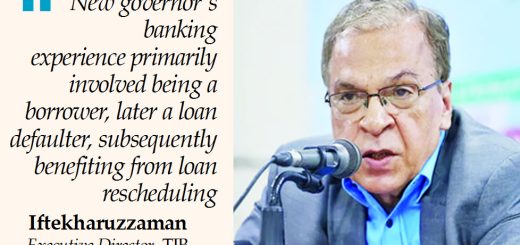Default surge leads to provision gaps in financial sector

Muhid Hasan :
The financial sector in Bangladesh is grappling with a growing provision shortfall, driven by a surge in defaulted loans that is threatening the overall stability of both banks and non-bank financial institutions (NBFIs).
According to the latest data from Bangladesh Bank, the provision deficits among 10 banks and 16 NBFIs have worsened, signaling a deepening financial strain across the sector.
According to the latest data from Bangladesh Bank (BB), ten banks, including six private commercial ones, faced a total provision shortfall of Tk 31,549 crore.
Similarly, sixteen NBFIs reported a combined provision shortfall of Tk 1,954 crore by June 2024, reflecting a further deterioration in their financial health.
Out of 35 NBFIs, sixteen including Aviva Finance, BD Finance, Bangladesh Industrial Finance Company (BIFC), Bay Leasing, FAS Finance, First Finance, GSP Finance, Hajj Finance, Industrial and Infrastructure Development Finance Company (IIDFC), Islamic Finance, Meridian Finance, Midas Finance, National Finance, Phoenix Finance, Premier Leasing, and Prime Finance-faced significant provision shortfalls.
Correspondingly as of June 2024, National Bank, BASIC Bank, Agrani Bank, Rupali Bank, Bangladesh Commerce Bank, Dhaka Bank, Standard Bank, Bangladesh Development Bank, IFIC Bank, and Southeast Bank were collectively responsible for a growing provision shortfall in the banking sector.
This increase in provision shortfalls among commercial lenders stems from institutional failures to meet fundamental security obligations in banking operations, signaling a weakening of the sector’s overall financial health.
According to the latest Bangladesh Bank report, default loans in the banking sector
reached Tk 2,11,391 crore, or 12.56 percent of total loans, by the end of June 2024. During the April-June quarter, classified loans rose by Tk 29,096 crore from Tk 1,82,295 crore in March.
Similarly, defaulted loans made up 33.15 percent of total loans in NBFIs by June, a significant increase from 29.27 percent in December 2023. The total amount of defaulted loans in NBFIs surged to Tk 24,711 crore in June 2024, as per BB data.
Experts noted that the non-performing loans (NPL) in the sector continue to rise as the entire financial system struggles to recover the loans.
The current economic situation has caused some borrowers to default on repayments, while certain institutions faced deposit contractions at a time when deposit growth was crucial, contributing to the provision shortfalls.
The World Bank (WB) in its Bangladesh update pointed out that “the NPL ratio remains elevated, and this figure understates the true extent of stress in the banking sector due to lax definitions, inadequate reporting standards, forbearance measures, and weak regulatory enforcement.”
Commenting on the situation, Abdul Hai Sarker, Chairman of the Bangladesh Association of Banks (BAB), warned that the high level of default loans poses a significant risk to the entire financial sector, which is the primary cause of the provision shortfall.
He also noted that over the past 15 years under Sheikh Hasina’s government, the sector has become fragile.
Sarker further mentioned that over Tk 1 lakh crore in loans have been borrowed from Shariah-based banks controlled by the S Alam Group, and a significant portion of these loans is expected to turn into defaults in the coming months, worsening the capital and provision deficits in the banking sector.
He also cautioned that the provision shortfall in both banks and non-banks will worsen if the true amount of defaulted loans is taken into account.






